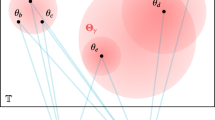Abstract
Many realists argue that present scientific theories will not follow the fate of past scientific theories because the former are more successful than the latter. Critics object that realists need to show that present theories have reached the level of success that warrants their truth. I reply that the special theory of relativity has been repeatedly reinforced by unconceived scientific methods, so it will be reinforced by infinitely many unconceived scientific methods. This argument for the special theory of relativity overcomes the critics’ objection, and has advantages over the no-miracle argument and the selective induction for it.
Similar content being viewed by others
Notes
In this paper, ‘some’ expresses a smaller quantity than ‘most’.
I drop the qualifier ‘approximately’ for the sake of simplicity in this paper.
Putnam’s no-miracles argument ranges over all successful theories.
References
Alai M (2016) Resisting the historical objections to realism: is Doppelt’s a viable solution? Synthese. doi:10.1007/s11229-016-1087-z
Chakravartty A (2008) What you don’t know can’t hurt you: realism and the unconceived. Philos Stud 137(1):149–158
Devitt M (2011) Are unconceived alternatives a problem for scientific realism? J Gen Philos Sci 42(2):285–293
Doppelt G (2007) Reconstructing scientific realism to rebut the pessimistic meta-induction. Philos Sci 74(1):96–118
Doppelt G (2014) Best theory scientific realism. Eur J Philos Sci 4(2):271–291
Enfield P (2008) P. Kyle Stanford, Exceeding our grasp: science, history, and the problem of unconceived alternatives. Br J Philos Sci 59(4):881–895
Fahrbach L (2011) Theory change and degrees of success. Philos Sci 78(5):1283–1292
Godfrey-Smith P (2008) Recurrent transient underdetermination and the glass half full. Philos Stud 137:141–148
Hafele JC, Keating RE (1972) Around-the-world atomic clocks: predicted relativistic time gains. Science 177(4044):166–168
Harker D (2008) P. Kyle Stanford, Exceeding our grasp: science, history, and the problem of unconceived alternatives. Philos Sci 75(2):251–253
Kitcher P (1993) The advancement of science: science without legend, objectivity without illusions. Oxford University Press, New York
Laudan L (1977) Progress and its problems: towards a theory of scientific growth. University of California Press, California
Leplin J (1997) A novel defense of scientific realism. Oxford University Press, New York
Mach E (1911) History and root of the principle of the conservation of energy (Jourdain P. E. B., Trans.). Open Court Publishing Company, Chicago
Magnus PD, Callender C (2004) Realist ennui and the base rate fallacy. Philos Sci 71(3):320–338
Mizrahi M (2013) The pessimistic induction: a bad argument gone too far. Synthese 190(15):3209–3226
Müller F (2015) The pessimistic meta-induction: obsolete through scientific progress? Int Stud Philos Sci 29(4):393–412
Park S (2011) A confutation of the pessimistic induction. J Gen Philos Sci 42(1):75–84
Plettner T, Byer RL, Siemann RH (2005) The impact of einstein’s theory of special relativity on particle accelerators. J Phys B At Mol Opt Phys 38:S741–S752
Poincaré H (1905/1952) Science and hypothesis. Dover, New York
Psillos S (1999) Scientific realism: how science tracks truth. Routledge, New York
Psillos S (2009) Grasping at realist straws, review symposium. Metascience 18:363–370
Putnam H (1975) Mathematics, matter and method (philosophical papers, vol 1). Cambridge University Press, Cambridge
Putnam H (1978) Meaning and the moral sciences. Routledge & K. Paul, London
Ruhmkorff S (2011) Some difficulties for the problem of unconceived alternative. Philos Sci 78(5):875–886
Saatsi J (2009) Grasping at realist straws, review symposium. Metascience 18:355–362
Stanford PK (2006) Exceeding our grasp: science, history, and the problem of unconceived alternatives. Oxford University Press, Oxford
Stanford PK (2009) Grasping at realist straws, review symposium. Metascience 18(3):379–390
Stanford PK (2015) Catastrophism, uniformitarianism, and a scientific realism debate that makes a difference. Philos Sci 82(5):867–878
van der Well A, van de Ven G, Maseda M, Rix HW, Rudnick GH, Grazian A, Finkelstein SL, Koo DC, Faber SM, Ferguson HC, Koekernoer AM, Grogin NA, Kocevski DD (2013) Discovery of a quadruple lens in CANDELS with a record lens red shift Z = 1.53. Astrophys J Lett. arXiv:1309.2826
Worrall J (1989) Structural realism: the best of both worlds. Dialectica 43(1–2):99–124
Wray KB (2013) Pessimistic induction and the exponential growth of science reassessed. Synthese 190(18):4321–4330
Wray KB (2016) Method and continuity in science. J Gen Philos Sci 47(2):363–375
Author information
Authors and Affiliations
Corresponding author
Rights and permissions
About this article
Cite this article
Park, S. Justifying the Special Theory of Relativity with Unconceived Methods. Axiomathes 28, 53–62 (2018). https://doi.org/10.1007/s10516-017-9336-4
Received:
Accepted:
Published:
Issue Date:
DOI: https://doi.org/10.1007/s10516-017-9336-4




